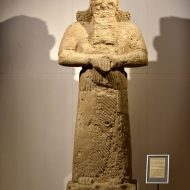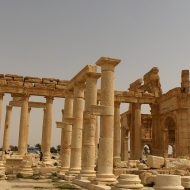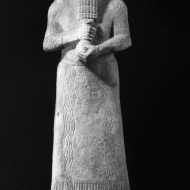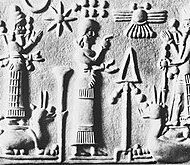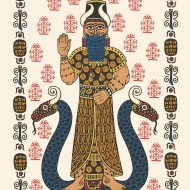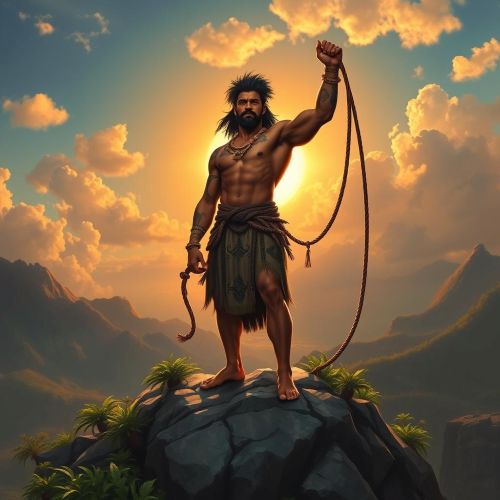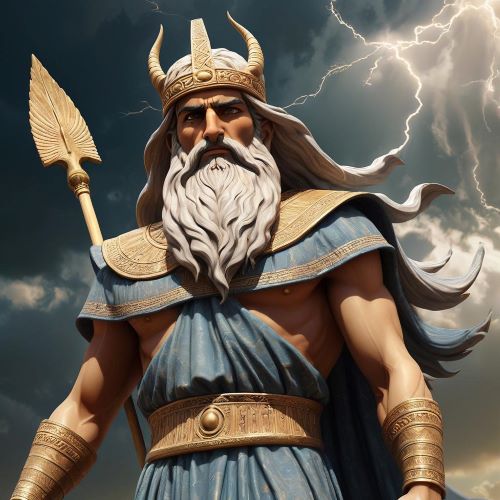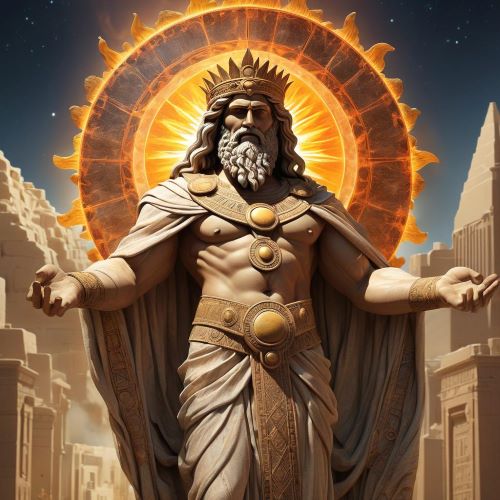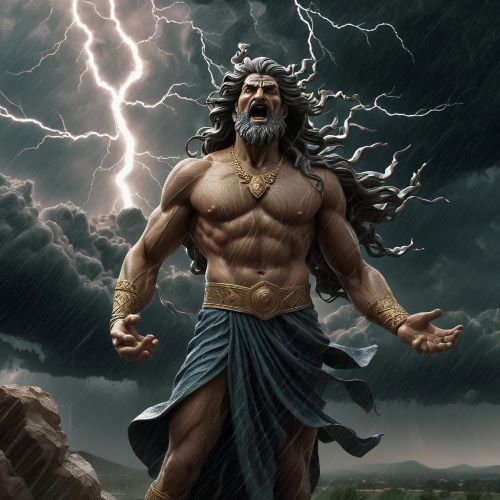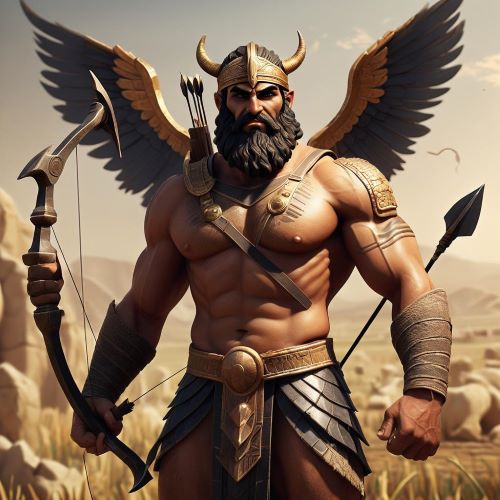Nabu : The God of Wisdom
Listen
At a glance
| Description | |
|---|---|
| Origin | Babylonian Mythology |
| Classification | Gods |
| Family Members | Marduk (Father), Sarpanitum (Mother), Gula (Sister), Tashmet, Nisaba (Wives) |
| Region | Iraq, Syria |
| Associated With | Wisdom, Literary Arts, Scribes |
Nabu
Introduction
Nabu, the Babylonian deity revered for wisdom, writing, and the abundance of nature. Beyond being a mere divine scribe inscribing clay with declarations and predictions, Nabu is credited as the originator of writing itself, the master weaver shaping destinies, and the nurturing force behind fertile lands. Whether in the vibrant streets of Babylon or the serene scriptoriums of scribes, Nabu’s influence permeated every aspect of existence, his visage a captivating fusion of youthful vitality and celestial knowledge.
Also recognized as Tutu, Nabu holds a significant place in Babylonian mythology as the venerable patron god of literacy, the rational arts, scribes, and wisdom. His name, meaning “the Announcer,” underscores his prophetic and creative abilities, summoning forth words, bountiful harvests, plant life, and the visions of prophecies in the ancient Mesopotamian tradition.
Physical Traits
Nabu is frequently portrayed as a youthful figure, devoid of a beard and adorned with a regal helmet. Despite his youthful appearance, his eyes convey an ancient wisdom that transcends the boundaries of time. In his grasp, he may hold the tools of his craft – a clay tablet and stylus, or wield a scepter adorned with a stylized cuneiform wedge, the very emblem of his authority. The youthful countenance of Nabu likely symbolizes the perpetual renewal of knowledge and the unending wellspring of creativity.
Contrastingly, Nabu is also depicted as a bearded man adorned in royal attire, wielding a stylus and standing atop the back of a snake-dragon known as the Mushussu Dragon. At times, a divine beard graces his chin, hinting at his connection to venerable Mesopotamian deities like the sage Enki. His symbols include a stylus resting on a tablet and a simple wedge shape. This cosmic being, composed of energy, exudes formidable power.
Family
Nabu wasn’t merely an independent divine figure; rather, he was intricately woven into the elaborate tapestry of the Mesopotamian pantheon. Born as the son of Marduk, the preeminent deity of Babylon, and Sarpanitum, the mother goddess, Nabu’s lineage positioned him as celestial royalty at the very core of divine authority. Adding to his familial ties, he had a sister named Gula, the goddess of healing, underscoring his dual association with wisdom and well-being.
Nabu is recognized as the offspring of the god Marduk and Sarpanitum. His spouse was the Akkadian goddess Tashmet. Additionally, in certain myths, Nisaba, the earlier Sumerian goddess of writing and accounts, is regarded as Nabu’s wife and divine collaborator in maintaining the records and overseeing the divine library.
Other names
Much like numerous ancient deities, Nabu assumed various appellations, each unveiling a distinct aspect of his multifaceted nature. As Tutu, the “sprout,” he embodied the agricultural realm. In the guise of Nisaba, the “lady of writing,” his patronage extended to scribes. Identified as Marduk’s “righteous son,” his role as the enforcer of cosmic justice took center stage. These alternative names intricately unravel the diverse associations that rendered Nabu a dynamic and influential figure.
In various cultures, Nabu is recognized by different names. In Greek mythology, he corresponds to Hermes, while in Roman mythology, he aligns with Mercury. Egyptian mythology identifies him with Thoth, and Norse mythology equates him to Odin. In the Bible, he is referred to as Nebo.
Powers and Abilities
Nabu’s divine prowess mirrored the diversity of his titles. In his capacity as the god of writing, he commanded the very currents of knowledge, etching the destinies of both mortals and gods onto clay tablets. He held the key to hidden wisdom, imparting prophetic insights and unraveling mysteries through oracles and divinations. His voice reverberated through dreams and omens, providing guidance to those who sought his counsel.
However, Nabu’s influence extended beyond the realm of words. He harnessed the elements, ushering in spring rains to quench arid fields and ensuring abundant harvests. As the divine architect, he played a pivotal role in constructing temples and cities, leaving an indelible mark on both the physical world and the domain of ideas. Nabu, revered as the patron god of scribes, literacy, and wisdom, also earned recognition as the inventor of writing, a divine scribe, and the patron deity of the rational arts and vegetation.
In his role as the god of writing, he inscribed the fates assigned to humanity, equated with the scribe god Ninurta. Functioning as an oracle, he found association with the Mesopotamian moon god Sin. As a cosmic entity possessing nearly boundless magical power, his spirit resides in the Helmet of Fate, the source of great power wielded by those bearing the mantle of Doctor Fate.
Modern Day Influence
Nabu’s impact resonates in contemporary times across diverse forms of media and literature. Notably, Nebuchadnezzar II, a formidable ruler and the longest-reigning king of Babylon, bears a name derived from Nabu. In the realm of popular culture, Nabu is credited as the creator of mystical relics bestowing magical powers upon Doctor Fate, a superhero featured in American comic books published by DC Comics. His name and story have inspired musical compositions by artists such as jazz pianist Marcus Roberts, Italian composer Giuseppe Verdi, and Kanye West.
Even though the once-majestic temples of Babylon now lie in ruins and the cuneiform script gathers dust in forgotten archives, Nabu’s legacy endures in various forms. His influence persists in the act of writing itself, serving as a poignant reminder of the profound capacity of the written word to transmit knowledge and shape our world. Archaeologists, akin to modern-day scribes, decode the secrets of ancient tablets, channeling the spirit of Nabu as they breathe life into the voices of the past.
Related Images
Frequently Asked Questions
What is lorem Ipsum?
I am text block. Click edit button to change this text. Lorem ipsum dolor sit amet, consectetur adipiscing elit. Ut elit tellus, luctus nec ullamcorper mattis, pulvinar dapibus leo.
What is lorem Ipsum?
I am text block. Click edit button to change this text. Lorem ipsum dolor sit amet, consectetur adipiscing elit. Ut elit tellus, luctus nec ullamcorper mattis, pulvinar dapibus leo.
What is lorem Ipsum?
I am text block. Click edit button to change this text. Lorem ipsum dolor sit amet, consectetur adipiscing elit. Ut elit tellus, luctus nec ullamcorper mattis, pulvinar dapibus leo.
What is lorem Ipsum?
I am text block. Click edit button to change this text. Lorem ipsum dolor sit amet, consectetur adipiscing elit. Ut elit tellus, luctus nec ullamcorper mattis, pulvinar dapibus leo.
What is lorem Ipsum?
I am text block. Click edit button to change this text. Lorem ipsum dolor sit amet, consectetur adipiscing elit. Ut elit tellus, luctus nec ullamcorper mattis, pulvinar dapibus leo.

